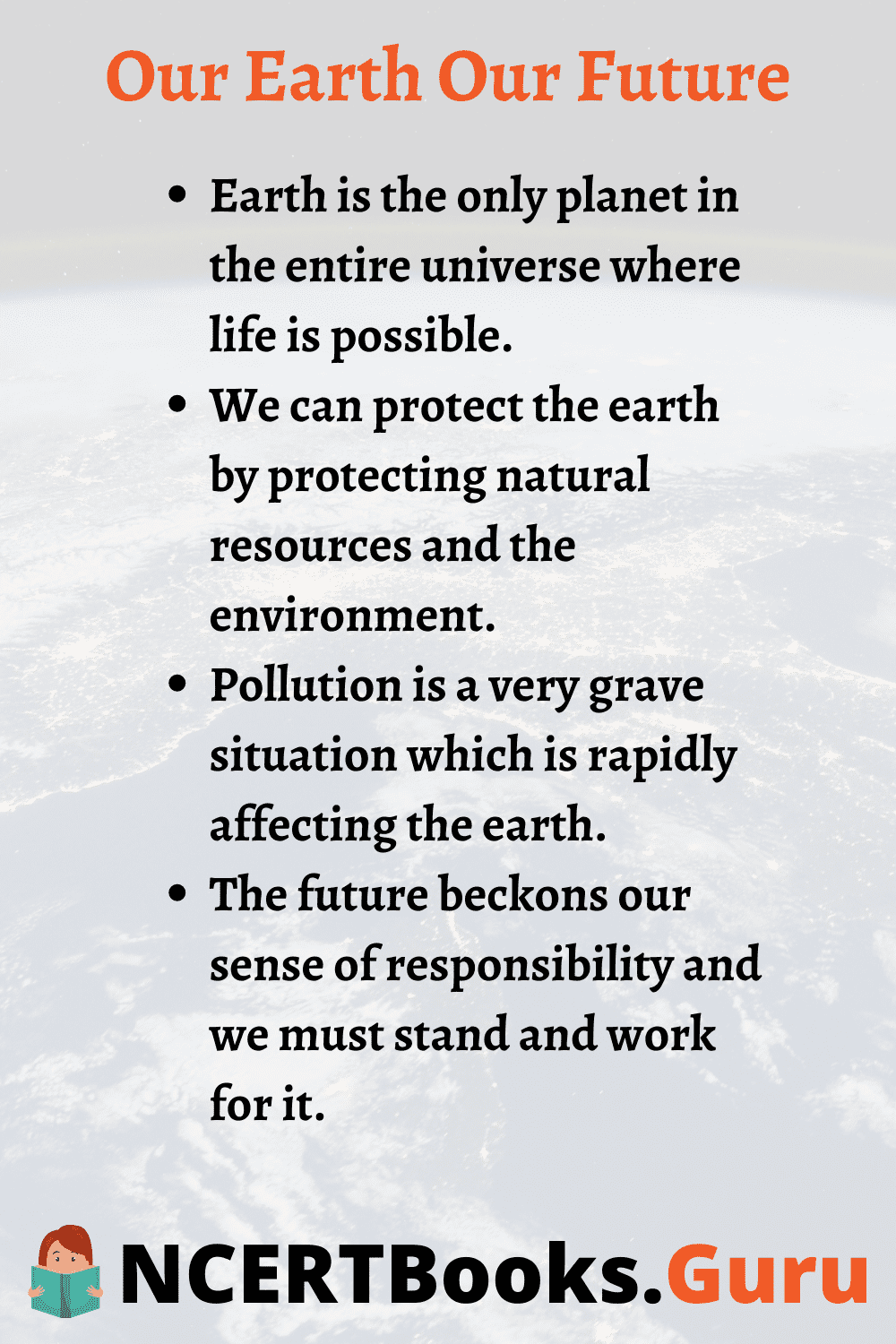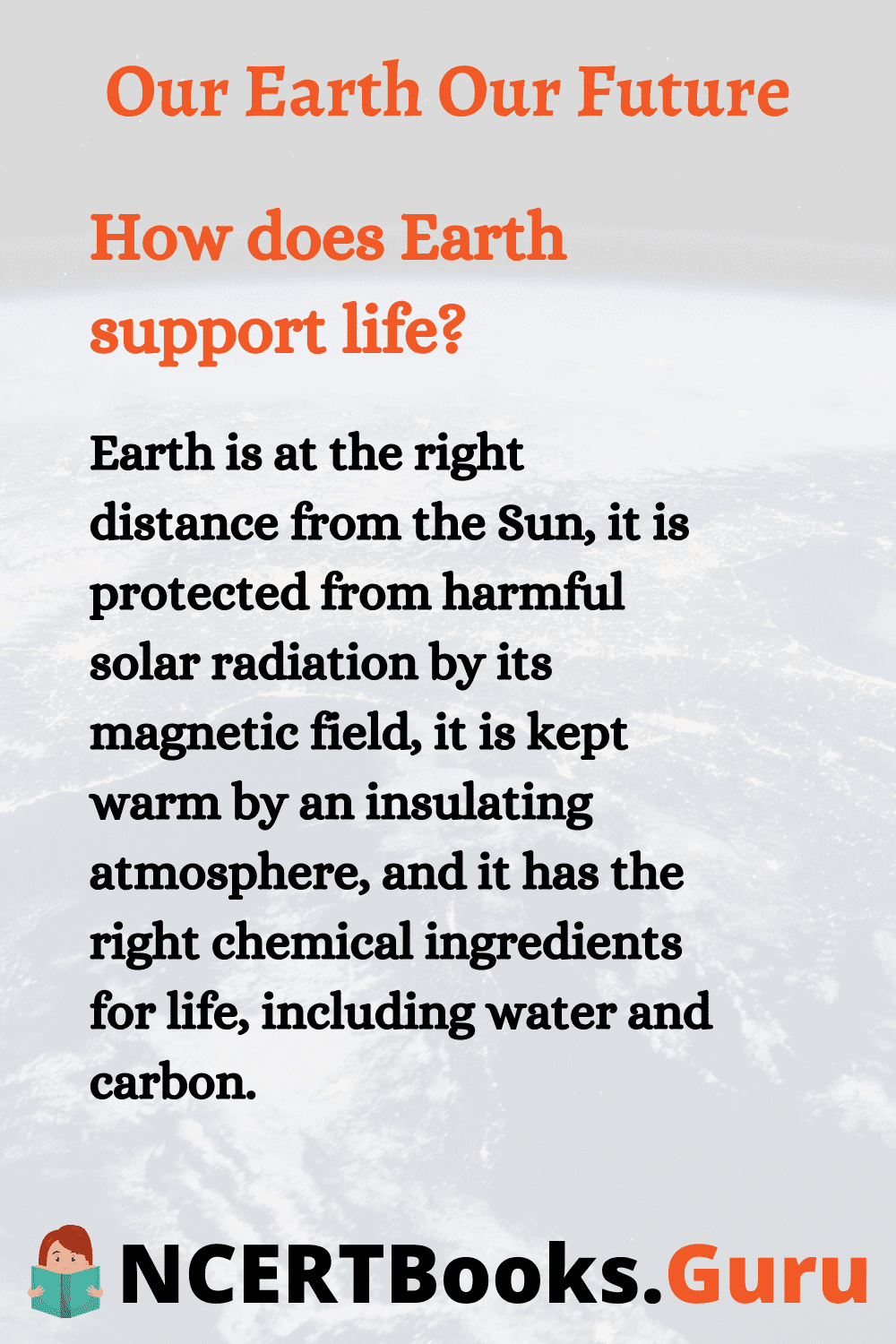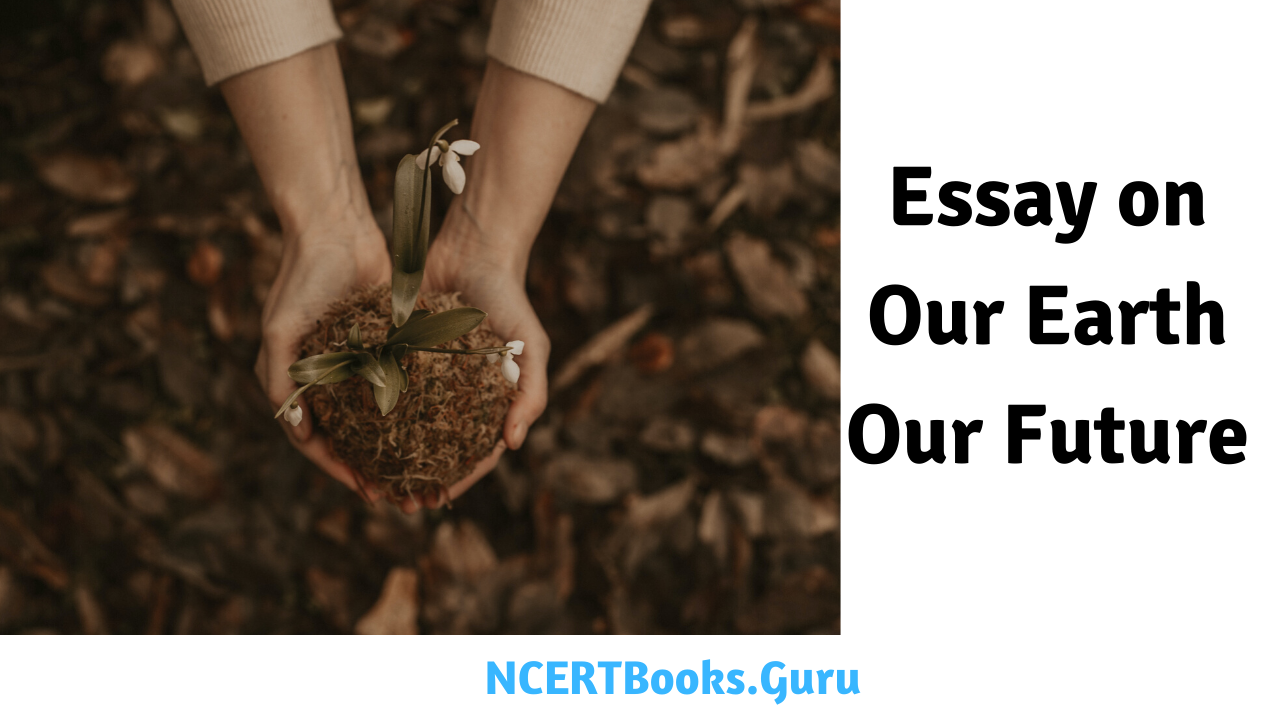Essay on Our Earth Our Future: True to the sentiments expressed by the playwright, the gentle showers of earth’s mercy has nourished and nurtured the human existence on this planet. Like pampered sons, we have received unidirectional blessings from nature. Unmindful of our intentions, the Mother Earth presented us with plenty to even assuage our griefs and disappointments. But our refusal to grow-up and hold the responsibility baton has tested the clock of nature.
“There is mercy in every place
And mercy, an encouraging thought.
Gives even affliction a grace
And reconciles man to his lot”
The breach of faith is a huge setback in any relationship. Our unmindful exploitation of natural resources has tested the generation limits of our planet. The cordial coexistence has assumed the shape of a tussle, as we debate the future of humanity on our planet.
Students can find more English Essay Writing Topics, Ideas, Easy Tips to Write Essay Writing and many more.
- Long Essay on Our Earth Our Future 600 Words in English
- Short Essay on Our Earth Our Future 600 Words in English
- 10 Lines on Our Earth Our Future
- What will happen if we do not take care of the earth?
- Why is Earth called a unique planet?
- How does Earth support life?
- Why is Earth Day so important?
Long and Short Essays on Our Earth Our Future for Students and Kids in English
If you are searching for a well-written Our Earth Our Future Essay in English, then this article provides you with two types of content, a 600 words long Essay on Our Earth Our Future and another 200-word short Our Earth Our Future Essay in English. These essays can be used by school children, students and teachers for various activities in schools and colleges.

Long Essay on Our Earth Our Future 600 Words in English
Long Essay on Our Earth Our Future is usually given to classes 7, 8, 9, and 10.
Planet earth provided for the most congenial environment for human existence. The primitive societies, with their limited needs, were content to garner them from the womb of the planet. The societies grew and the problems magnified. Industries stepped-in as temples of growth to satisfy the needs of one and all. The rest, as is said, is history. The engines of growth rolled on, oblivious of their impacts.
The monomaniac man had only profits and growth in his vision. He exploited every facet of the richness of nature-land, water, biodiversity, and sources of energy till nature bled and exhausted the supply of mercy. Human Population, itself, has become the biggest question mark on the future of man. The population-resource imbalance is enormously unfavorable for the sustenance of humanity. The basic survival needs of food, water, shelter are all in crisis due to our growing number.
Food security is a potent threat to the teeming millions. The limits to the expansion of agriculture, along with our unsustainable land use, have brought us to the- brink of disaster. Sustainability demands that our actions are embroiled in a concern for our future generation. However, indiscriminate use of chemical fertilizers and pesticides and unsuitable cropping practices have exhausted our soil resource. Food production has stagnated globally. Rapid urbanization and diversion of land for commercial purposes have accentuated the crisis.
As global warming takes over, food production will suffer due to the uncertainties of rainfall regimes. The human preparedness remains an issue of concern. The warming itself is our very own creation. The monster which has grown into an intellectual challenge for the global community took shape under our actions and greed. The overdependence on fossils fuels in an indiscriminate luxury-oriented approach enveloped us in a blanket that has become too heavy to bear. The lungs of our planet – the very symbols of life, our forests, became the victims of the blatant exploitative greed of humanity. These resources were enriching our soils and ameliorating our climate as a faithful friend in the human growth story. But the expansionist drive saw the blades run down rich reserves of food, fuel, and fodder.
The vaporization of huge forest reserves sucked the vitality of human existence. The nourishment of soil was threatened and loose soil spread the desolate landscape of deserts on the face of the earth. The charging of aquifer stagnated and the groundwater level has been receding. Urbanization brought along its own share of problems. The fault was not in the process but the pace and the unmindful nature which accompanied the menace. While solid waste management of cities remains deplorable, attacking our land resources, water extraction through pumps has been reckless. The growing number of vehicles in the urban jungle has added layers of toxic, choking us and the atmosphere.

Industries contributed to the cause by the irresponsible discharge of chemicals in the water bodies killing the flora and fauna of the marine ecosystem. The view was always parochial, short-sighted, and immediate goals were the focus. A vision and holistic approach were missing and the links between actions and their effects took time to dawn. This time gap proved detrimental. Biodiversity, the very richness of life on the planet, showed signs of crises. While the tankers had spilled enough to stifle marine biodiversity, other habitats were also not pristine. Humanity, in search of resources to build its growth, had exploited every corner. The corals were dying, tigers vanishing but humans failed to trace the link to the things to come. The human approach to growth and prosperity has always turned a blind eye to the environment and its replenishment. Such consciousness has been considered as a domain of activists and a hurdle to the growth process. There is enough for everyone’s need but not for anyone’s greed’.
Mahatma was accurate in his observation and the visionary could predict the direction of human progress. The lesser mortals even failed to follow his advice. Sustainability in the use of resources has been neglected by one and all. Sustainable development is the crying need of the hour for ensuring the future of humanity on this planet. The understanding has to dawn that we have delayed the efforts already, as global warming knocks on our doors. It is only one of the signals from nature, that the time to act sensibly is imminent and ticking away.
A glance at our growth story will showcase a myriad of potholes. The process has widened the gulfs in our society and alienated segments from reaping the fruits of development. It has turned a blind eye to the deletion of fossil fuels and the heavy accumulation of greenhouse gases. It is time to switch over to sustenance in our activities and in our attitude. The melting glaciers, erratic rainfall patterns, threats of disappearing nations by a rising sea level and increasing regularity of diseases is for real. It is disturbing enough to shake us out of our slumber and instill a mission-mode readiness in our efforts. A determined global effort is needed to shift to the use of a renewable energy regime. An environment-friendly and sustainable regime is needed which will not add a burden on the future generations for our deeds.
The understanding requires the nations to inculcate an ‘eco-eco’ ideology, which calls for an ‘ecology-economy’ equilibrium. Sustainability does not come at the price of growth and development and human endeavor can deliver them simultaneously. They can coexist and enrich each other to the benefit of coming generations. A major breakthrough in our efforts can happen only if we adopt an attitudinal change. The mentality of ‘robbers’ loot has to give way for sharing of resources whether land, water, or minerals. Resources should become a perpetual tool and not exhaustible reserves if the development is pragmatic.
Such efforts would require the involvement of people at every stage of planning, execution, and evaluation and a paradigm shift is essential in our centrally dictated use of resources and sense of ownership could infuse miracles and bring about a turnaround in the conservation of resources for the future generation. With a sense of ownership, responsibility towards the use of resources will be generated. The tribal will be integrated into forest management and fishermen as coastal eco-force. While each citizen will develop an energy-efficient outlook, every farmer will take care to enrich fields. The participation of people will accelerate the pace of efforts that appear isolated and insufficient when planned by the authority.
This does not abdicate the state of its responsibility. It, rather, becomes more relevant and the crusade has to be carried proactively by the State. Promotion of energy-efficient equipment, a gradual policy shift to renewable sources of energy, and the promotion of public transport systems in the city have to be the state’s priority. The land resource sustenance has to be integrated with forest protection, conservation, and promotion. Efforts like social and urban forestry have multifarious dimensions and transmit multiple gains to society. Such programs have to be integrated with the lives of the population by percolating them to the grassroots.
Sustainable agriculture could strengthen the backbone of weakening food security. Proper planning of land use with dedicated grazing fields, bio-fertilizers and manures, natural pests as pesticides, and making each drop of irrigation water count can deliver better returns from our efforts to maintain the fertility of our land resources. The shift from demand-based to region-specific needs to be appreciated to develop each region holistically on its strength.
Industrial accountability is a key that can unlock the secret to humanity’s survival. A more responsible behavior from the profit mongers can be evinced by taxation or through the innovative approach of “natural resource accounting and budgeting”. Monetary value to every careless act of polluting the natural resource may heighten the awareness of these growth seekers. The plantation can be promoted by industries as part of their social responsibility.
Proper waste management system for cities with planned landfills or incineration plants is a must as urbanization is the order of the day; sustainable cities can become gateways for long term growth. Water harvesting through rooftop systems and pollution check of vehicles would ensure a greener environment and availability of water for future generations. Slums that stand out for their poor hygiene and irreverence towards ecology – must receive a holistic up-gradation plan.
Yet another tool is Environment Impact Assessment, which should become a mandatory organ of any development scheme. It is an anticipatory and preventive effort, which utilizes multidisciplinary knowledge to predict and prevent the damages that a development project may bring along. This tool would promote the simultaneous march of sustainability with ecology. The lopsided approach of the human march on this planet has raised issues of his own survival. It has been an act of hara-kiri. We have denounced ‘common-sense’ and ‘rational’ for the dictated and imposing.
Students can find more English Essay Writing Topics, Ideas, Easy Tips to Write Essay Writing, and many more.
Short Essay on Our Earth Our Future 600 Words in English
Short Essay on Our Earth Our Future is usually given to classes 7, 8, 9, and 10.
The development of the resources should be a democratic process for and by the people. Each region has unique variables and each should be strengthened to find its own sustainable solution. It calls for recognition of local, traditional, and indigenous wisdom. It demands a “glocal” approach where the vision is global but action at the grassroots level is local.
The problem of securing a better future for coming generations is a genuine and real concern, where the onus is on each one of us. The effort has to come not only at global organizations but through actions of every individual as we strive towards the Gandhian concept of Swaraj the village republics. It is through small efforts at local levels that our resources will be sustained for a better tomorrow. ‘A beautiful waterfall, a majestic tiger, lush green farms of paddy and cool breeze of spring’ should remain an experience for generations to come and not reduced to pages from history. The mission has begun. The future beckons our sense of responsibility and we must stand and work for it.
10 Lines on Our Earth Our Future
- Earth is the only planet in the entire universe where life is possible.
- It provides useful water and oxygen for life.
- We can protect the earth by protecting natural resources and the environment.
- We should plant more trees and plants to keep the Earth Safe as it is our future.
- Utilization of natural resources such as coal, petroleum, minerals, etc should be reduced and focus should be made on renewable sources of energy.
- Pollution is a very grave situation which is rapidly affecting the earth and negatively impacting the life of human being and other animals.
- It’s our responsibility to safeguard the earth and give it to our next generations.
- The effort has to come not only at global organizations but through actions of every individual as we strive towards the Gandhian concept of Swaraj the village republics.
- If we don’t save the earth from pollution, global warming, etc, then we too will perish with it.
- The future beckons our sense of responsibility and we must stand and work for it.

FAQs on Our Earth Our Future
1. What will happen if we do not take care of the earth?
The potential scenario: the glaciers and polar ice caps would melt, sea levels would rise. Entire archipelagos and land areas could be permanently flooded.
2. Why is Earth called a unique planet?
It is unique among planets in our solar system for having water in its liquid form at the surface, in an amount conducive to life evolving.
3. How does Earth support life?
Earth is at the right distance from the Sun, it is protected from harmful solar radiation by its magnetic field, it is kept warm by an insulating atmosphere, and it has the right chemical ingredients for life, including water and carbon.
4. Why is Earth Day so important?
Earth Day will educate and mobilize more than one billion people to grow and support the next generation of environmental activists.
Bond of Love Summary
